By Adrianne Bee, Rachel Howard, and Jennie Lay
How do you take a creative spark and turn it into a successful company? Seven alumni offer advice.
#1 Listen to your customers.

Andrew Ly, president, CEO, Ly Brothers Corporation. Photo by Gino De Grandis
Andrew Ly (B.S., '86) wasn't the most rested SF State student. Between classes, he operated a doughnut shop he owned with his four brothers. "It was tough," he says. "I studied all day and worked all night, rolling and firing doughnuts before delivering them to coffee shops." Occasional power naps took place in the J. Paul Leonard Library.
The former busboy, doughnut roller and deliveryman's hard work has taken him to the head of the Ly Brothers Corporation, the $42 million parent company of Sugar Bowl Bakery. One of the largest and most successful family-owned and operated bakeries in Northern California, Sugar Bowl's four plants deliver treats to Bay Area retail stores, restaurants and coffee shops, and to warehouse clubs across the country. (One customer apparently joined her local Costco solely to buy Sugar Bowl madelines).
Although the operation has expanded from its humble beginnings, Ly still dons a hair net daily to chat with some of his 375 employees at plants in San Francisco and Hayward. And he still draws from his business degree. "My education at SF State helped me a lot," Ly says. "Good professors and classes. Environmental Law and Accounting helped me set long-term and short-term objectives and understand how to deal with strengths and weaknesses of a company."
Ly calls his customers "the real bosses" and takes their suggestions seriously. Suggestions like removing trans fat from his entire product line -- which he did before the removal was mandated by the Food and Drug Administration. "Do you know how hard it is to make a doughnut without any trans fat?" he says.
Sugar Bowl employees enjoy some sweet benefits, including financial rewards for reading pre-approved business books like "The World is Flat" by Thomas L. Friedman, and funding for college courses. Ly's attention to their needs as well as those of his community helped earn him the Bay Area's Most Admired CEO award, presented by the San Francisco Business Times in November 2007.
#2 Cut the lifeboats.

Chris Larsen, co-founder, CEO, Prosper. Photo by Gino De Grandis
Chris Larsen (B.A., '84) co-founded and served as CEO of E-LOAN until he sold it for $300 million in 2005. But it took three business failures before he successfully launched the online lending company -- hard-learned lessons that he says were ultimately appealing to Silicon Valley investors. He admits he also had the good fortune of attracting an Internet incubator project called CommerceNet back when they were showing off "this new Web site called Yahoo! and it was really, really slow," he says.
Having fought hard for consumer access to credit scores and greater transparency in lending, Larsen says the Internet has become "the great equalizer" as a source for improved access to information. "Information is power and that's good for consumers," he says. As an entrepreneur, Larsen revels in the freedom of coming up with new products and watching them grow. Now he is taking his longtime consumer-friendly pursuit of greater financial transparency to the next level. Larsen is the co-founder and CEO of Prosper, an online marketplace where complete strangers can loan money to one another.
Larsen says it took a serious evolution in technology for Prosper to become possible. It does not merely use the Internet as an information source, but allows consumers to be the bank too. For Prosper to function, Larsen needed the ready availability of credit scores -- something he fought for while at E-LOAN -- plus the evolution of electronic payments through PayPal and the rise of online social networking.
Once again, Larsen -- who says he studied accounting at SF State because "that's the language of business" and "it's good to hone the numbers" -- may be one step ahead of the curve. As banks have retreated from lending during the past year, he says Prosper has seen a dramatic increase in credit-worthy borrowers. "The credit crunch is good for person-to-person lending," Larsen says.
He credits much of his success to good mentors who inspired him to move ahead without overburdening him with caution. The best advice he received came from an SF State professor who told him to start his own business, and "Cut the lifeboats."
#3 Be prepared to put in long hours.
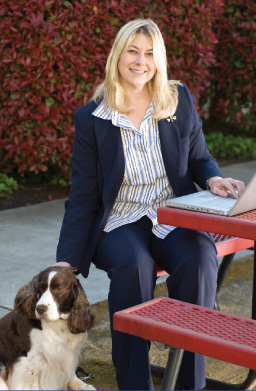
Liz Ellis, founder, CEO, Green Valley ConsultingEngineers, with "business partner" Cody.
Photo by Gino De Grandis
Liz Ellis (B.S., '90) worked her way through college at a large North Bay civil engineering firm. She put in long hours, traveled a lot and holed up in a cubicle. Then she decided she wanted to bring her dog to work -- and that was her first flicker of a business plan.
It's the American dream to start your own business and profit from your hard work, she says -- and she wanted to do it with her best pal at her feet. She also wanted the personal space to show her horses and nurture her garden. Ellis began to envision a move from the big, open-ended military contracts she was doing to parks, local cities, and recreation-based projects.
"I wanted to do something a bit more involved in nature. Green instead of pavement," says Ellis, founder and CEO of Green Valley Consulting Engineers in Santa Rosa. Since its inception in 1997, Ellis' firm has grown from two to more than 20 employees. True to her word, her team has designed plenty of parks, soccer fields, streetscapes, wineries and creek restoration projects -- with an emphasis on saving natural resources, not paving them. Her company philosophy is big on flex time, family time and flexible commutes.
Above and beyond class work, Ellis says the practical in-the-field experience she gained through the SF State civil engineering program let her fast track into the industry -- a field that has traditionally seen few women in its ranks. Owning your own business gives you "a crash course in everything," she says, ranging from filing to phone systems. "No matter how many times you think about how much time and energy it takes, you have no idea how much work it is. Starting your own business is not for the faint of heart."
For Ellis, it has paid off in award-winning projects, including a coastal park in Fort Bragg, a regional riverfront park in Sonoma County, and a pedestrian path in her hometown of Santa Rosa. And by default, the industry keeps her at the forefront of the green movement. Ellis says civil engineering is in the unusual position of having new, recycled materials become available every month -- materials she can introduce to our built environment to reduce waste, increase recycling, minimize runoff, and maximize sun and clean runoff.
"I'm starting to do some of my dream projects along the way," says Ellis, who recently expanded her firm to include landscape architecture, which means more people to manage and less hands-on project time. "The hardest part of growing is that you can't keep ownership of the projects. The challenge is to give that up."
#4 Be patient with bureaucracy.
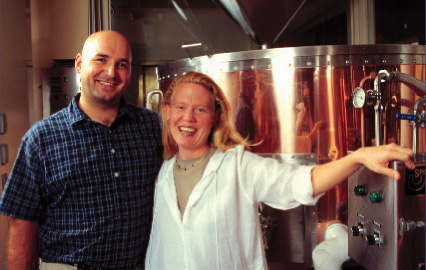
Gar and Lara Truppelli, co-owners, The Beach Chalet and Park Chalet. — Photo by Jason Doly
At 23, Gar Truppelli (M.B.A., '94) had a vision for a boarded-up building overlooking San Francisco's Ocean Beach -- but he wasn't alone. He was one of 100 aspiring entrepreneurs hoping to lease the landmark structure from the city. "At a pre-bid meeting we were told it would be at least three years before new construction could start," Truppelli recalls. "About half the crowd walked. I thought, 'That's cool. I can wait. I can raise the money while I go to school.'"
He and his future wife Lara (B.A., '93) went into action, calling on friends and friends of friends and family until 30 investors, including real estate developer Timon Malloy, signed on. Meanwhile, Gar worked on a plan for the restaurant in a business writing class, drawing from research conducted for Ellen Sheely's course in marketing management. "A group of marketing students, we'd stand on the street and ask people, 'What do you want to see here? Who are you?'" Gar says. Lara, then a psychology major, joined in the research, quizzing surfers on their dining preferences.
The Truppellis shaped their plans to please all potential diners -- neighbors, tourists and city officials alike. "One [city] supervisor asked if we'd have a liquor license," Gar recalls, laughing. "He was a bourbon drinker. I said, 'We'll get a license and we'll name a drink after you.'"
After three years of negotiations with the city, their persistence and patience paid off. In 1995, Mayor Willie Brown (B.A., '55) approved the Truppellis' proposal and a year-and-a-half later, The Beach Chalet opened its doors. "It was a hit," Lara says, remembering lines that stretched outside for months.
"We learned early on how to manage volume," Gar says. Menus were simplified and staff added. They also learned to be smart about money, but never skimp. "The cheap piece of equipment will end up costing you $5,000 in repairs," he says. His other advice? Map out a detailed business plan. "The ones who don't, their failure rate goes way up."
The Beach Chalet has been serving up American food, microbrews, live music and sweeping views for more than a decade while adjoining Park Chalet, added in 2004, offers an alfresco dining option in Golden Gate Park. Thanks to a steady stream of tourists (found mainly among the lunch and breakfast crowds) and locals, the restaurants together generate roughly $8.5 million in annual revenue -- success that is shared with the community. Lara leads the Truppellis' many philanthropic efforts.
Looking back, Gar says he appreciates that his classes at SF State weren't just about making the grade. "I had an idea of what I wanted to do and my professors understood that. They were ready to help students put [their business training] into real life."
The Truppellis still do their homework. After quizzing more passersby and negotiating with more city officials, they were approved to open a third restaurant. Their winning proposal included a $2 million pledge toward upgrades at Oakland's Lake Merritt Boathouse, where they expect to open for business next summer.
#5 Do what you love.
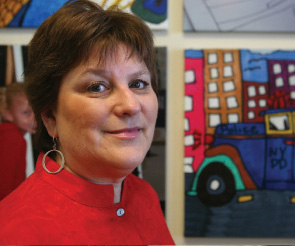
Shell Herman, founder, CEO, KidzArt. Photo by Leland A. Outz
Shell Herman (B.A., '74; M.S., '81) spent her early career helping other people find their niches. As a vocational rehabilitation counselor, she taught her clients to hone new skills, find creative outlets and seek jobs they would be passionate about. Like her driving philosophy to this day, Herman's mantra was always "do what you love."
It wasn't until funding for art was slashed from her son's school curriculum that Herman used her training on herself and found her own passion. She set her sights on bringing fine art back into education and KidzArt, her franchise-based art education business for after-school programs, was born. Starting with a single school in Sacramento, Herman and her business partner, Chris Cruikshank, have since grown KidzArt from a parent-paid program into a nationwide after-school curriculum that is filling the fine arts void in some of the country's neediest schools.
Herman had formerly dabbled in theater, oil painting and pastels. But with the evolution of her art education programs, she found her creativity best directed into her business. "I am not an actor. I am more of a director," she says. At the same time, she chose a franchise model for her growing international business because she says she didn't want to be the boss in a corporate office. As a mom, she saw the merits of a home-based business, and of giving other people the chance to be their own boss.
KidzArt offers drawing-based programs for two-year-olds to teens. Classes introduce sketching techniques designed to nurture brainstorming and creativity. "We have a no-mistakes philosophy. There's no right or wrong way -- and no need to crush kids with confining rules in such a subjective field," Herman says. "Confidence just soars."
Being a franchiser, she learned, can be a rocky but rewarding road. "You don't have to be a starving artist to bring art into your life. You can have a thriving business using art," she says. Indeed. KidzArt made Entrepreneur Magazine's Franchise 500 three years running and Franchise Times Magazine's Fast 55 for two years in a row.
#6 Don't listen to everything your professors tell you.
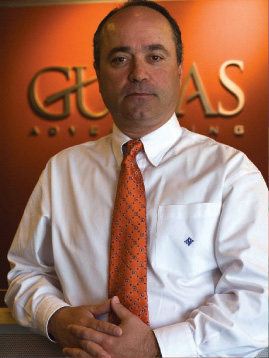
John Gumas, president, founder, Gumas Advertising. — Photo by Gino de Grandis
When John Gumas (B.S., '84) graduated with a degree in marketing, he told his professors he was going to start his own advertising agency. They told him he was crazy. The economy was in recession and entry-level advertising jobs were scarce, but "I had that entrepreneurial spirit," Gumas remembers. "It's born inside you."
That spirit powered him through some tooth-and-claw years, building his business one small client at a time. In the early days, as Gumas created campaigns for local restaurants and "dressed people up in costumes and had them hand out stuff," Gumas stocked shelves at a grocery store on weekends. "One time a client walked in and I remember hiding behind the boxes in the back so he wouldn't see me," Gumas says. But the small restaurant clients became large restaurants; a liquor store he created ads for grew into a national chain. And along the way, Gumas Advertising developed a distinctive niche: thinking smart for companies being heavily outspent in advertising by their competitors.
Today his clients -- like SummerHill homes, Hewlett-Packard and SanDisk -- aren't nearly as small as they once were. And Gumas Advertising has become a major San Francisco success story, named one of the city's top agencies by the San Francisco Business Times. The niche that evolved so naturally -- helping small businesses grow against tough odds -- is one that Gumas finds personally gratifying. "I was in a meeting today where a client leaned over and gave me a hug because their business was going through the roof," he says. "They had looked at marketing as an expense, but now they see it as an investment."
He says his real-world experience at SF State allowed him to launch his own business fresh out of school, against all odds. "My professor Jack Tenge encouraged me to be part of the advertising club," Gumas says, remembering a student campaign for Maxwell House coffee that took second place in the national American Advertising Federation competition. He still keeps in touch with another SF State professor, Joe Ries, and he's grateful for his teachings. "They told me not to start my own agency because it's a tough business," Gumas says. "That was the only lesson I didn't take."
#7 Find inspiration in your family.
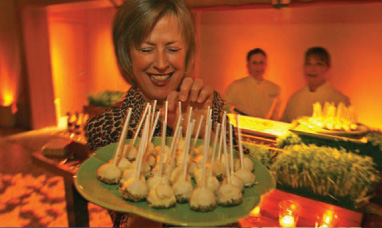
Paula LeDuc, CEO, founder, Paula LeDuc Fine Catering.
Photo by Michael Macor
For Paula LeDuc (M.A., '73), founder and CEO of Paula LeDuc Fine Catering, everything connects back to her brother.
Dennis Fantin, blind since childhood, was her inspiration for earning a master's in special education at SF State, and the reason she returned after graduation to help Professor Philip Hatlen found the Living Skills Center for the Visually Impaired in San Pablo. It was while creating the center that Hatlen remembered the passion for cooking in LeDuc's family, and introduced her to SF State Culinary Arts program head Ken Wolfe.
"We were building a curriculum to teach the blind," LeDuc says. "How to open a milk carton, how to turn a burner on and off, how to slice an apple." But soon, fired up by Wolfe's teachings, LeDuc thought, "Wouldn't this be a great thing to pursue, just for my own life?" She became Wolfe's private apprentice, studying under him for eight years. In 1980, a friend asked her to cater a party. Word of her delectable concoctions spread until, in 1985, LeDuc incorporated her business, and in 1990 moved it out of her own home, where she had washed lettuce in a sterilized bathtub, and into an Emeryville warehouse.
Today, Paula LeDuc Fine Catering occupies three state-of-the-art buildings, employs more than 500 part-time staff, and has served everyone from George Lucas to Bill Clinton. LeDuc is renowned for innovation -- whether serving sushi "ice cream cones" or freezing battery-operated lights inside bowls of ice to produce glowing desserts. She credits this creativity to the example set by her brother and father.
"I never worked for anyone else; I didn't have to model myself after anyone," LeDuc explains. "I grew up in a family of no obstacles. Whatever Dennis needed, my dad built, whether it was making maps with strings around the borders so he could learn geography or putting a bell inside a basketball so he could play."
Today, Dennis Fantin holds a dual Ph.D. in biochemistry and physics and teaches at Cal Poly. Meanwhile, LeDuc recently landed her dream client, Oprah Winfrey, catering two private events in Winfrey's home. "It's the coolest thing in the whole wide world," LeDuc gushes. "She told me she'd never had better food in her life."